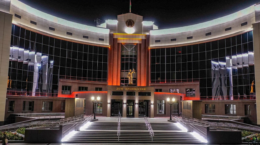On November 1, 2024, the Ministry of Internal Affairs of Belarus updated its list of individuals involved in extremist activities, adding human rights defender Olga Karach, director of the human rights organization “Our House” to the list for the first time as a private individual.
It’s worth noting that this is not the first time the Ministry of Internal Affairs has attempted to impose restrictions related to Olga Karach’s activities. Over the past several years, the Ministry has classified “Our House” and its leader as extremists 18 times in various forms. This list has included the organization’s social media channels, Karach’s personal accounts, and any work-related materials. However, this is the first time that such restrictions have been directly imposed on her as an individual.
Being added to the extremist list has serious consequences. In Belarus, accusations of extremist activity carry the threat of imprisonment for up to seven years.
In the case of Olga Karach, in addition to the threat of imprisonment, Lukashenko’s government has imposed an additional sanction. Due to her designation as an extremist, the regime has banned her from military service in Belarus for a minimum of 17 years. This restriction is based on parts 3 and 4 of Article 18 of the Law “On Countering Extremism.” According to this law, individuals with a finalized criminal conviction face a ban on military service, which remains effective until the conviction is overturned and continues for another five years after the removal of the criminal record.
This step seems particularly absurd considering that Olga Karach has never expressed any intention to serve in the military. Moreover, as a well-known human rights defender, she actively campaigns for the rights of Belarusian men to refuse military service.
This new measure likely represents a desperate symbolic gesture, highlighting how deeply the regime fears Olga Karach and her advocacy for Belarusian conscientious objectors and deserters. The Belarusian government not only intimidates its citizens but also expands these absurd restrictions, attempting to eliminate even the theoretical possibility that someone fighting for the right to refuse conscription could ever find themselves in the military.
This situation underscores the increasingly absurd logic of the repressive apparatus in Belarus.












